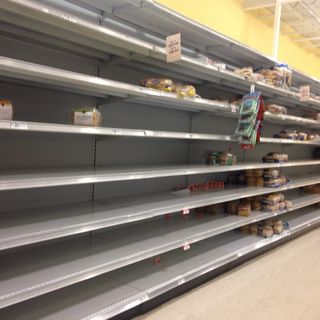Anxiety
Panic-Shopping: The Psychology of the Bread-Milk-Eggs Rush
It's not as irrational as you might think.
Posted January 23, 2016
If you’re like 85 million Americans – that’s about ¼ of the nation’s population - you’re spending the weekend hunkered down at home as the first winter storm of the year unloads upwards of a foot of snow on much of the Southeast. And a few days ago, as the forecast solidified into something increasingly dire, as schools and workplaces preemptively shut their doors, and as the local news could talk about little else, you probably made a grocery run, grabbing bread, milk, eggs, and other staples from the dwindling supplies.

We mock this behavior on social media. We scoff at images of the empty dairy cases that signal the end of days rather than a mere snowstorm. We judge because we know that on some level, the panicked grocery run is pretty irrational. Really, don’t most people have enough food to weather a storm that, at worst, will leave them housebound for three days? How much milk do people really drink? How many omelets can one family eat? However, irrational as it seems, the panic-shop does serve a few important psychological needs.
Last week, as weather maps put my own central Virginia in the center of the action, I admit that I felt vaguely nervous, worrying about what I was going to eat while snowed in. There was some small comfort to be found in grocery shopping. There was a tension release as I looked at my full shopping cart with satisfaction. It just felt good. In a sense, it’s as simple as that.
There’s also a need for control at play here. This massive storm, which, you know, might just pose “a threat to life and property,” is coming right at us and there is nothing anyone can do about it. We hate feeling helpless, completely at the whim of nature's randomness, and one of the few things we can control is the amount of food in the fridge. So, we stock up and rest easier, knowing that we did what we could.
But panic-shopping is also a social phenomenon, shaped by powerful normative pressure. We see those nearly-bare grocery store shelves and wonder, “What am I missing here? What does everyone else know that I don’t?” In an unpredictable situation, like an impending snowstorm, we often look to other people to determine the appropriate course of action. And, if we know that everyone else is grocery shopping, we will too. (In this sense, it’s not unlike a bank run.)
There's also something ritualistic about the panic-shop, something that bonds us to one another in a slightly scary and uncertain time. The pre-snow grocery run is something we do, “we” being members of a community. In this sense, it’s not unlike putting up a Christmas tree or have a Labor Day cookout. It’s just a ritual. It’s what we do in the winter, when snow is coming: we buy bread, milk, and eggs. We also watch the local news and cheer when our school or workplace comes across the ticker – “closed!” We wear flannel and sweats; we get out the candles and the flashlights. We dig out our car. We wait. It snows more, and we dig out again. We may be physically isolated in our homes, but these rituals keep us from truly feeling alone.
As a social psychologist, this basic tendency to panic-shop actually makes perfect sense to me. What I do find endlessly baffling is the fact that, when housebound, people actually think they’ll want to chow down on bread, eggs, and milk rather than on potato chips, chocolate, and wine.
Hey, more for me.


